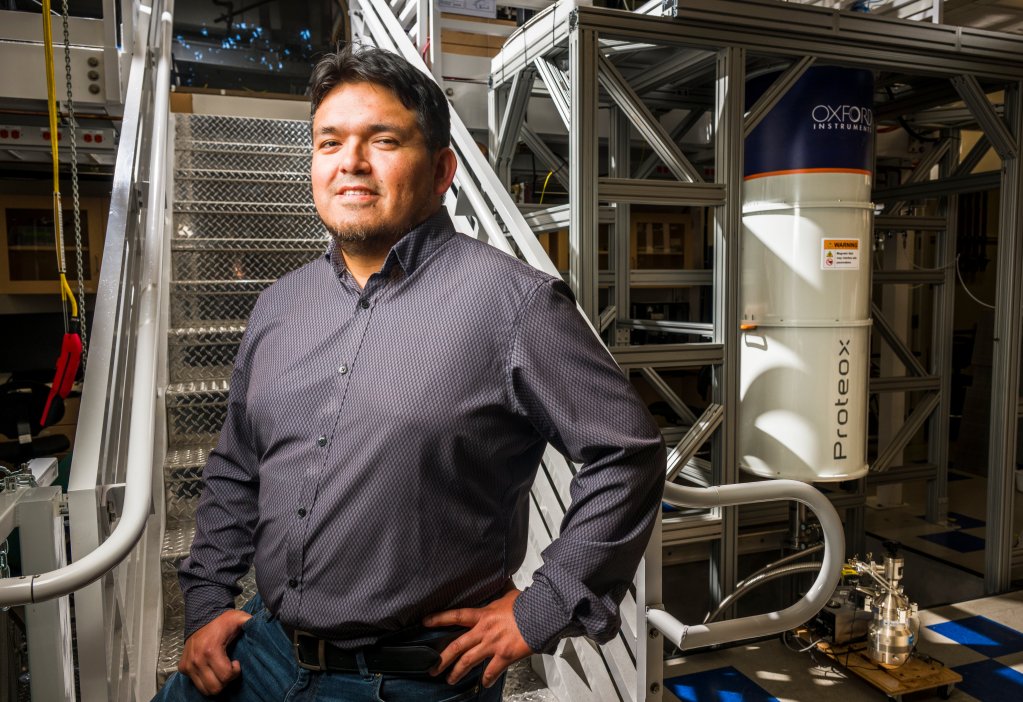
A team of researchers at the University of California, Irvine (UCI), led by physicist Luis Jauregui, has made significant strides in the field of quantum physics, potentially paving the way for advancements in quantum computing. Their recent discovery focuses on a new state of quantum matter involving excitons, which may have far-reaching implications, including applications in deep-space travel.
Jauregui, who directs the Quantum Materials and Devices Lab at UCI, emphasizes that while their work involves complex theories, the core idea is to validate the existence of new quantum phenomena. “It’s not an invention, exactly. It’s an idea, or a theory, that we can show to be true,” he stated. His latest research revolves around materials like hafnium pentatelluride, which was developed in his lab by postdoctoral researcher Jinyu Liu.
The team’s research is particularly relevant as it explores the behavior of electrons that can spin in tandem rather than in opposite directions, a phenomenon that has never been observed until now. This discovery could lead to the development of computers that are resistant to radiation, a crucial factor for technology used in deep-space exploration. “It’s something that could be used during deep-space travel,” Jauregui noted, highlighting the practical applications of their findings.
Funding Challenges and Opportunities in Quantum Research
Despite the promising nature of their work, the landscape for scientific funding is becoming increasingly challenging. A report from the Union of Concerned Scientists revealed that federal scientific research grants dropped by half in the first six months of 2025 compared to previous years. This decline in funding for basic research, which does not have immediate commercial applications, may hinder future discoveries.
Jauregui, however, remains optimistic. He believes that basic research is essential, stating, “All kinds of research can always lead to something.” His lab has received support from organizations such as the National Science Foundation and the University of California’s Office of the President, positioning it at the forefront of quantum research.
The implications of Jauregui’s work extend beyond basic science; they represent a potential shift in how quantum computers could be built and operated. Current computers rely on binary systems, but quantum computers promise to perform multiple calculations simultaneously, utilizing the unique properties of quantum materials.
Exploring New Frontiers in Quantum Materials
The concept of excitons, which are pairs of electrons that spin together, offers a new dimension in understanding quantum matter. Unlike traditional states of matter—solid, liquid, gas, and plasma—quantum matter introduces various forms that scientists are just beginning to explore. Jauregui and Liu’s research challenges existing theories and aims to uncover more about the fundamental rules of the quantum realm.
To observe excitons, the team subjected hafnium to extreme conditions, including a magnetic field 700 times stronger than typical refrigerator magnets and temperatures comparable to those found in deep space. These conditions were achieved at the Los Alamos National Laboratory in New Mexico, a facility with a rich history in scientific research.
Jauregui noted the excitement in exploring the unknown: “Every time we look, with better tools and purer materials, nature surprises us.” His team is now planning further experiments to delve deeper into the properties of excitons and potentially discover new states of quantum matter.
The research conducted at UCI signifies a vital intersection of basic science and practical application. The knowledge gained from these explorations could lead to breakthroughs that not only enhance technological capabilities but also contribute to a broader understanding of the universe.
As Jauregui reflects on his journey from a curious child in Peru to a leading physicist, he emphasizes the importance of fostering curiosity in scientific inquiry. He believes that investing in basic research is an investment in the future, allowing humanity to continue exploring the mysteries of the cosmos and enhancing our understanding of the world around us.






